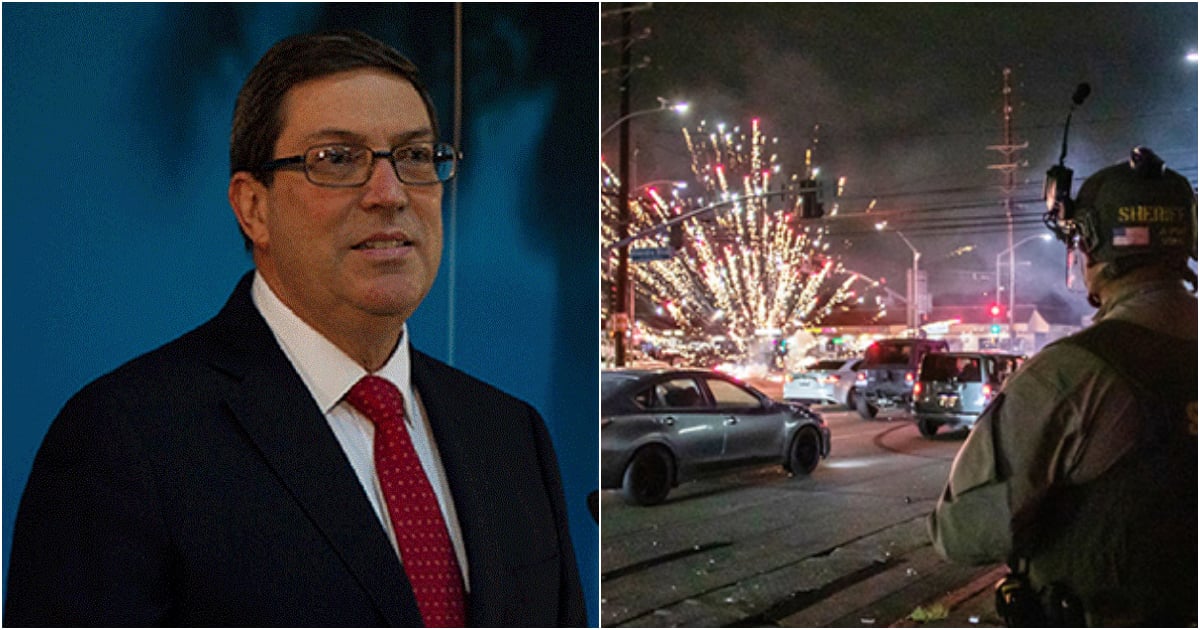Bruno Rodríguez Parrilla, Cuba's Foreign Minister, sparked a wave of critical responses after posting on his X account about the excessive force used in recent protests in Los Angeles, United States. "In Los Angeles protests, we witnessed excessive force, deployment of the U.S. National Guard, journalist attacks, and migrant rights violations. Yet, we haven't seen any condemnation from anti-Cuban politicians. Their hypocrisy is severe and disturbing," he wrote.
However, his silence regarding repression in Cuba, particularly during the events of July 11, 2021, and their aftermath, was swiftly highlighted by users who quickly reminded him of the 11J incidents. On that day, tens of thousands of Cubans took to the streets in various cities demanding freedom, only to be met with a wave of repression that included mass arrests, speedy trials, and harsh sentences.
One user questioned, "And what about July 11, 2023, and the days following in Cuba... what did you see?" Others urged him to "show the photos from July 11" and to stop "posting videos from other countries."
Hypocrisy and Double Standards
The criticism focused on the glaring inconsistency of the Cuban government, which is quick to denounce events abroad but remains utterly silent on repression within its own borders. Several commenters reminded him that in Cuba, even those who attempt to march peacefully "with a flower in hand" are repressed, and that there are still prisoners for protesting, without even minimal legal defense guarantees.
One user was more direct, labeling the foreign minister as "hypocritical" for representing a government that "at the slightest sign of protest from the people" suppresses and exclusively uses force against any dissent.
Repression Remains Fresh in Memory
The pent-up outrage over the 11J repression, the imprisonment of demonstrators, and systematic censorship resurfaced powerfully on social media, where every official attempt to divert international attention is met with the echo of a people who do not forget.
This episode exposes the disconnect between the Cuban government's external rhetoric and its internal practices. While it denounces violence in other countries, it avoids any criticism of its own history of repression, attempting to legitimize its international stance while ignoring its citizens' demands.
Rodríguez also faced strong criticism when he celebrated mass protests on Saturday, April 5, in the United States against the authoritarian profile of Donald Trump's administration. From official spokespersons and Communist Party-controlled media, the government amplified images of the marches.
"It's called democracy... you choose who to vote for and can protest if you disagree. Something you can't do... you always vote for the same failed model, and it's very difficult to protest without ending up worse off than you are," commented a user at the time.
Repressive Reality in Cuba
In Cuba, anyone who dares to express disagreement with the regime is immediately stigmatized, harassed, or imprisoned. Citizen mobilizations are suppressed with unjustified arrests, digital connection blockades, massive police operations, and smear campaigns against those who dare to raise their voices.
The government's double standards don't stop there. While it applauds the respect for the right to protest in the United States, within the island, that same right is a chimera. Article 56 of the Constitution, which theoretically protects peaceful demonstrations, remains a dead letter: there is no legal mechanism to enforce it. Any attempt to exercise it is branded an attack on the "socialist system."
This contradiction of the regime, defending foreign protests while repressing its own, is not new, but it is particularly cynical in the current scenario. Official propaganda, which demands sovereignty and non-intervention when Cuba is criticized, has no qualms about meddling, distorting, and exploiting international events to sustain its ideological narrative.
Trump ordered the deployment of around 2,000 National Guard troops in California without the consent of Governor Gavin Newsom, as a response to protests against immigration raids conducted by the Immigration and Customs Enforcement (ICE).
The Los Angeles police engaged in pitched battles with protesters in downtown and the suburb of Paramount, California, after declaring a protest illegal and pushing to disperse the crowd. "If you lay a hand on a law enforcement officer, you will be pursued to the fullest extent of the law," threatened Homeland Security Secretary Kristi Noem.
Understanding the Cuban Government's Contradictions
Why did Bruno Rodríguez face criticism for his comments on U.S. protests?
Rodríguez was criticized for condemning excessive force in U.S. protests while remaining silent on Cuba's own history of repressing its citizens, particularly during the 11J protests.
What is the significance of the 11J protests in Cuba?
The 11J protests on July 11, 2021, were significant as tens of thousands of Cubans demanded freedom, facing a harsh government crackdown with mass arrests and severe sentences.
How does the Cuban government handle dissent?
In Cuba, dissent is often met with stigmatization, harassment, imprisonment, digital blockades, police operations, and smear campaigns against those who protest.
